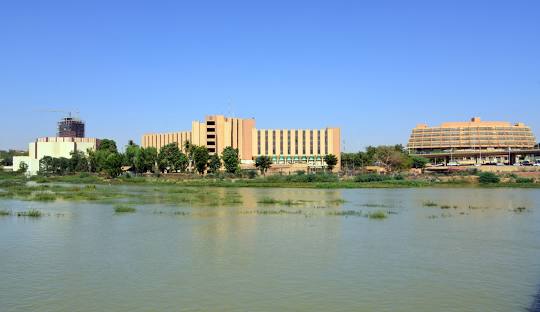Niamey, Niger
🇳🇪 Niamey, Niger
🏜️ Sahelian Serenity on the Banks of the Niger River
📍 Introduction: The Capital in the Dunes
Niamey is a quiet and modest capital nestled along the Niger River, where Saharan winds meet Sahelian traditions. While often overshadowed by its more bustling West African neighbors, Niamey surprises visitors with its warmth, earthy rhythm, and cultural depth. It’s a place where camels roam beside traffic, riverboats drift lazily past fishermen, and artisans craft ancient stories into jewelry and leather.
🗺️ Top Attractions in Niamey
🏞️ Niger Riverfront & Pirogue Rides
Take a traditional boat ride at sunset, where herons fly low and the banks are dotted with local life. A peaceful and authentic way to see the city.
🐘 Parc W (W National Park – Day Trip)
A UNESCO-listed biosphere reserve just outside the city, home to elephants, antelope, baboons, and over 300 bird species. Perfect for eco-travelers.
🎨 Musée National Boubou Hama
A combined zoo and museum featuring ethnographic exhibits, local crafts, and reconstructed tribal villages—a good primer on Niger’s ethnic diversity.
🕌 Grand Mosque of Niamey
One of the most iconic religious structures in the city. Visit during non-prayer hours for architecture and insight into Islamic influence.
🛍️ Grand Marché de Niamey
This market buzzes with vendors selling everything from spices to Tuareg silver. A labyrinth of stalls full of color and craftsmanship.
🍽️ What to Eat in Niamey
🍲 Must-Try Dishes
-
Djerma Rice with Goat Stew – A staple local meal.
-
Jollof Rice with Fried Fish – Spicy and satisfying.
-
Moringa Leaf Sauce with Millet Balls – A unique taste of the Sahel.
🍴 Where to Eat
-
Café Cabane Bambou – Open-air dining with local and continental dishes.
-
Restaurant Le Pilier – For upscale meals and regional specialties.
-
Amandine Café – Popular with locals and expats for snacks, coffee, and sweets.
🏨 Where to Stay in Niamey
💎 Luxury
-
Radisson Blu Hotel Niamey – The city's top luxury stay with river views, spa, and international standards.
-
Bravia Hotel Niamey – 4-star comfort with a pool, modern rooms, and great service.
🛏️ Mid-Range
-
Hôtel Terminus – Reliable, central, and with traditional hospitality.
-
Hotel Sahel – Comfortable, budget-friendly, and near key attractions.
💰 Budget
-
Villa Cedria – Cozy guesthouse vibes with personalized service.
-
Auberge Gamkalley – Friendly, clean, and ideal for backpackers.
🧭 Best Neighborhoods to Explore
🌇 Plateau
The city center—safe, walkable, and home to embassies, restaurants, and hotels.
🛶 Rive Droite (Right Bank)
More relaxed, scenic, and dotted with gardens and views over the river.
💡 Travel Tips
✈️ Getting There
-
Diori Hamani International Airport (NIM) offers connections from West Africa and Europe.
-
Local taxis are widely available—negotiate the fare before entering.
🌤️ Best Time to Visit
-
November to February – Cooler months and pleasant weather.
💬 Language
-
French is the official language; Hausa and Zarma are commonly spoken.
💵 Currency
-
West African CFA Franc (XOF). Credit cards are accepted in high-end places; cash is preferred.
🎶 Culture & Vibe
🎧 What to Expect
-
Music is mostly traditional or West African pop. Niamey has a calm nightlife scene with occasional live music at cafes or hotels.
🥁 Local Culture
-
Tuareg leather goods, Fulani jewelry, and Hausa embroidery reflect Niger’s ethnic blend.
-
Visitors are often welcomed warmly, but dress modestly and respect Islamic norms.
🛡️ Safety & Travel Essentials
-
Safety: Niamey is generally safe in the city center. Avoid border regions and check travel advisories.
-
Etiquette: Greetings are important. Learn a few words in French or Hausa for deeper connections.
-
Water: Stick to bottled water and avoid street ice.
📊 Overall Rating:
| Category | Rating (out of 10) |
|---|---|
| 🌆 City Charm & Atmosphere | 7 |
| 🍽️ Food & Dining | 6.5 |
| 🖼️ Culture & Heritage | 8 |
| 🌿 Nature & River Experiences | 7.5 |
| 💸 Affordability | 8.5 |
| 🧘♂️ Calmness & Authenticity | 7.5 |
| 🚶 Ease of Exploration | 6.5 |
🎯 Why Visit Niamey?
If you’re looking for an off-the-beaten-path African capital that offers tranquility, authenticity, and rich cultural roots, Niamey is worth your time. It’s a river town at heart, rooted in tradition but open to slow exploration. Come for the views, stay for the people, and leave with stories only the Sahel can tell.


